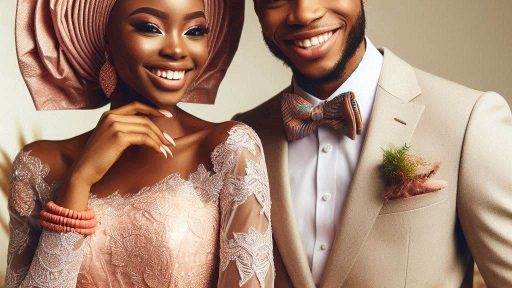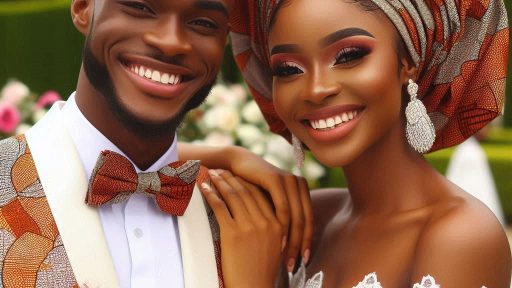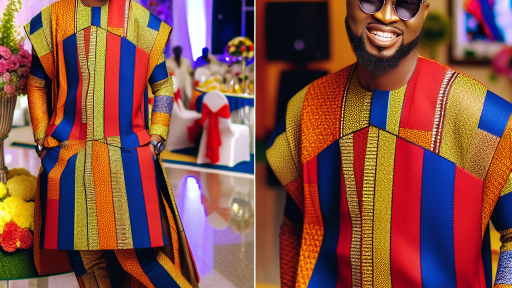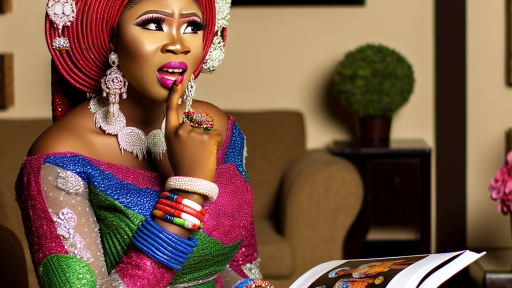Introduction
Nigerian bridal couture showcases a vibrant landscape of fashion.
Designers blend tradition with modern aesthetics.
The result is breathtaking wedding attire that captivates brides worldwide.
In Nigeria, bridal fashion plays a pivotal role in weddings.
It transforms a special day into an unforgettable experience.
Insight into the cultural significance of wedding attire
Wedding attire carries immense cultural significance in Nigeria.
Each region shapes its unique style, reflecting diverse ethnic backgrounds.
From the intricate beading of the Yoruba to the colorful wrappers of the Igbo, each detail tells a story.
Brides often select outfits that honor their heritage while embracing contemporary trends.
The rise of Nigerian bridal couture marks a significant cultural shift.
Traditional garments evolve with modern design elements.
Designers now infuse innovative cuts, fabrics, and embellishments into their creations.
This combination elevates classic styles, making them suitable for the modern bride.
Brides today seek unique designs that tell their personal stories.
They desire outfits that showcase their individuality while remaining rooted in tradition.
This demand encourages local designers to push boundaries, resulting in stunning collections that break the mold.
The growing interest in Nigerian bridal couture has also gained global recognition.
Social media platforms amplify the reach of Nigerian designers.
Aspiring brides browse through a plethora of styles at their fingertips.
Popular influencers showcase breathtaking bridal fashion, which inspires countless brides-to-be.
The digital age allows designers to connect with a wider audience, garnering international acclaim.
Nigerian bridal fashion has grown to represent more than just clothing.
It encapsulates a celebration of love, heritage, and identity.
With the rise of stunning designer collections, brides gain access to a rich tapestry of styles.
Each dress resonates with cultural pride and modern elegance.
As the world embraces Nigerian bridal couture, brides can enrich their big day.
Unique designs can elevate their wedding experience.
Choosing an outfit represents a reflection of their personal journey.
The fusion of tradition and modernity ensures that every bride radiates confidence and beauty on her special day.
Historical Background of Bridal Couture in Nigeria
Understanding the evolution of bridal fashion in Nigeria provides insights into today’s bridal couture scene.
The historical journey showcases a dynamic blend of tradition and modernity.
Over the years, Nigerian bridal couture has transitioned from traditional attires to contemporary designs that resonate globally.
Evolution of Bridal Fashion: Traditional to Modern Aesthetics
Nigerian bridal fashion has undergone significant transformation.
Initially, brides adorned themselves in traditional garments that celebrated cultural heritage.
These outfits included elaborate garments made from rich fabrics, hand-stitched embroidery, and colorful patterns.
As globalization took root, modern aesthetics began to intersect with traditional designs.
Designers started reshaping bridal outfits to cater to contemporary brides.
This included incorporating Western elements alongside traditional fabrics and styles.
- Traditional attires such as the ‘isi agu’ and ‘gele’ became intertwined with modern elements.
- Brides began experimenting with different fabrics, embellishments, and silhouettes.
- Fashion shows and exhibitions encouraged new design interpretations, showcasing local talent.
- The rise of social media led to greater visibility for innovative styles.
- Today’s brides showcase a diverse range of outfits, infusing personal style into traditional contexts.
Influence of Various Cultures and Tribes on Bridal Styles
Nigeria is a melting pot of cultures and tribes, each contributing unique elements to bridal couture.
Various tribal customs dictate how brides dress for their wedding day.
These influences ensure that no two bridal looks are ever identical.
- The Yoruba culture emphasizes vibrant colors, intricate embroidery, and headpieces known as ‘gele’.
- Ibo brides adorn themselves in traditional lace known as ‘aso ebi’, often with matching attire for family and friends.
- The Hausa culture showcases elaborate designs, rich fabrics, and distinct bangles that signify status and beauty.
- Tribal patterns and prints are now widely appreciated across cultural boundaries, promoting inclusivity in fashion.
- This fusion of styles allows brides to represent their cultural heritage while embracing contemporary nuances.
Notable Shifts Over the Decades and Key Designers
Over decades, bridal couture in Nigeria has experienced notable shifts, fostering innovation and embracing diversity.
Several key designers have emerged and made significant contributions to this evolution.
- In the 1980s and 1990s, designers like Deola Sagoe introduced contemporary styles into traditional frameworks.
- Tolu Bally gained recognition for blending luxurious fabrics with eclectic designs appealing to modern brides.
- Other designers, such as Fisayo Longe and Ade Bakare, have further pushed boundaries, creating distinct identities for bridal fashion.
- Fashion weeks and local exhibitions allowed designers to showcase innovative ideas and collaborations.
- As bridal fashion became more visible, international recognition grew, paving the way for global acceptance of Nigerian couture.
The influence of Nigerian bridal couture extends beyond the borders of Nigeria.
The unique blend of tradition and modernity in designs captivates brides from various cultures.
Today’s Nigerian bridal fashion has thus established itself on the international stage, inspiring global bridal trends.
As brides prepare for their big day, the choices from Nigerian bridal couture showcase the rich tapestry of cultural influences.
The evolution of bridal attire has become a powerful mode of expression.
Brides now celebrate their unique identities, blurring the lines between tradition and modernity.
Nigerian bridal couture stands at the confluence of history, culture, and modern aesthetics.
The evolution from traditional to contemporary designs highlights the versatility and creativity of Nigerian designers.
As we celebrate these changes, we recognize their significance for future brides.
Choosing Nigerian bridal couture embraces rich cultural heritage, artistry, and timeless tradition.
Your wedding attire reflects both personal style and cultural identity, making your celebration unique.
Through couture, brides express love, unity, and family.
As Nigerian bridal fashion evolves, it continues to inspire and resonate with brides today and will keep inspiring countless brides worldwide.
The Current Trend of Nigerian Bridal Couture
Nigerian bridal couture has undergone remarkable transformation in recent years.
Trendsetters in the industry continuously redefine what it means to be a bride in Nigeria.
This evolution reflects a blend of tradition and modernity, resulting in stunning creations that captivate the eye.
Couples now seek unique styles that echo their personalities and cultures.
Popular Styles in Contemporary Bridal Wear
Today’s brides embrace a variety of styles.
Traditional and modern elements coexist beautifully in Nigerian bridal fashion.
Here are some of the most popular styles:
- Bespoke Gowns: Custom-designed dresses reflect the bride’s individuality.
Designers work closely with brides to create stunning pieces that match their visions. - Aso Oke Attire: This traditional fabric remains a favorite.
It features unique patterns and vibrant colors, often worn in tandem with a stunning gown. - Lace Details: Lace embellishments add a touch of elegance.
Brides increasingly incorporate lace into their dresses and accessories. - Ball Gowns: These voluminous silhouettes create a fairy-tale look.
With intricate beading and embroidery, ball gowns remain a top choice. - Mermaid Styles: The hourglass silhouette enhances the bride’s figure.
This fitted design adds drama and sophistication. - Two-Piece Sets: A growing trend among brides includes separates.
These modern sets allow for versatility and creativity in stylizing the bride’s look.
Fabrics and Textures: What’s In?
The choice of fabric plays a vital role in bridal fashion.
Nigerian designers favor luxurious textiles.
Here are some popular options:
- Satin: Satin gowns exude opulence.
The smooth texture catches the light flawlessly. - Tulle: Tulle adds volume and ethereality.
Brides use it to create layers in their dresses. - Sequined Fabric: Sparkling sequins enhance glamour.
They work perfectly for evening receptions and fairy-tale weddings. - Chiffon: This lightweight fabric provides flow and movement.
Chiffon dresses look graceful, especially in garden weddings. - Organza: Organza is stiff yet delicate.
It creates structure in layered skirts and off-shoulder designs.
Colors Influencing Contemporary Bridal Wear
Color choice significantly impacts bridal fashion trends.
While white remains a classic, Nigerian brides explore diverse palettes.
Popular colors include:
- Ivory: A soft alternative to stark white, ivory radiates warmth and elegance.
- Pastels: Light colors like blush, lavender, and mint add a romantic touch.
They complement various wedding themes beautifully. - Bold Hues: Rich colors such as emerald green and royal blue demand attention.
These shades reflect individual style and make striking statements. - Metallics: Gold and silver dresses create a stunning impact.
Brides increasingly opt for these lustrous finishes.
The Role of Luxury and Bespoke Couture
Luxury and bespoke bridal couture define the modern wedding experience.
Couples prioritize unique designs that showcase their love and commitment.
Here’s how bespoke couture plays a vital role:
- Personalization: Custom designs allow brides to express their personalities.
This emphasis on individuality has become a common trend. - Quality Materials: Luxury bridal wear uses high-quality fabrics.
The craftsmanship reflects meticulous attention to detail. - Exclusive Access: Bespoke gowns ensure that brides wear something no one else has.
This exclusivity enhances the wedding experience. - Enhanced Comfort: Custom-made dresses fit perfectly.
Brides can confidently move throughout their special day.
Impact of Social Media on Bridal Fashion Preferences and Trends
Social media significantly influences bridal fashion.
Platforms like Instagram, Pinterest, and TikTok showcase the latest styles.
They create a space for inspiration and engagement among brides-to-be.
Here are key impacts of social media:
- Increased Visibility: Designers gain exposure to a wider audience through social media.
Brides discover various styles and trends quickly. - Trendsetting Influencers: Social media influencers help shape fashion preferences.
Their content often sets new trends among brides. - DIY Inspirations: Many brides want to personalize their dresses.
Social media provides plenty of DIY ideas and tutorials. - Community Engagement: Social media allows brides to connect with others.
They share experiences, tips, and inspiration for their weddings.
In fact, Nigerian bridal couture is experiencing a vibrant transformation.
This evolution showcases the blend of tradition, luxury, and individuality.
Brides are now embracing contemporary styles, rich fabrics, and innovative designs.
As social media continues to influence preferences and trends, the industry is poised for more exciting developments.
The rise of these trends signifies that your bridal choices can reflect your personality, making your big day even more special.
Whether you choose bespoke luxury or playful DIY elements, there is a world of possibilities awaiting you.
Read: Top Nigerian Wedding Fashion Trends You Need to Know
Key Designers and Their Contributions
Nigeria’s bridal couture has seen a significant rise over the years.
Several designers have established themselves as key players in this vibrant industry.
Their signature styles have not only redefined bridal fashion but have also profoundly impacted how brides perceive their big day.
In this section, we will explore some of the most prominent Nigerian bridal designers and their unique contributions to the bridal couture scene.
Prominent Nigerian Bridal Designers
- Folake Folarin-Coker: Founder of Tiffany Amber, she is a pioneer of contemporary Nigerian fashion.
- Deola Sagoe: Known for infusing traditional techniques with modern silhouettes.
- Zizi Cardow: Famous for her intricate beadwork and regal aesthetic.
- April by Kunbi: Seamlessly integrates African prints into bridal silhouettes.
- Yemi Osunkoya: Renowned for his exquisite fabrics and detailed craftsmanship.
Each of these designers brings a unique perspective to bridal couture.
Their works embody a blend of cultural heritage and contemporary elegance.
Let’s examine their signature styles in more depth.
Signature Styles of Key Designers
Folake Folarin-Coker
Folake Folarin-Coker’s designs often incorporate luxurious fabrics and elaborate embellishments.
Her bridal gowns exude sophistication and femininity.
She embraces the use of vibrant colors, making each piece a statement.
Many brides prefer her signature A-line silhouettes, which offer both comfort and style.
Her artistry blends traditional techniques with international trends.
Deola Sagoe
Deola Sagoe is known for her rich cultural narratives within her designs.
Each gown tells a story, drawing inspiration from various aspects of African culture.
She favors flowing, ethereal fabrics that create a dramatic effect.
Brides adore the intricate patterns and detailed embroidery featured in her collections.
Her ability to merge tradition with modern fashion stands out in the industry.
Zizi Cardow
Zizi Cardow focuses on regal aesthetics, often highlighted by her dramatic trains and structured silhouettes.
Her designs regularly showcase intricate beadwork and striking color palettes.
This designer aims to make women feel powerful and beautiful.
Many brides choose Zizi’s creations for their unforgettable grandeur and timeless appeal.
Cardow’s works are perfect for the bride wanting an impressive entrance.
April by Kunbi
April by Kunbi emphasizes contemporary styles with a touch of traditional flair.
Her bridal gowns often feature bold prints that celebrate African heritage.
She combines vibrant colors with flowing fabrics to create stunning pieces.
Brides appreciate her unique take on the classic wedding dress.
Her designs allow brides to express their individuality while honoring cultural roots.
Yemi Osunkoya
Yemi Osunkoya is celebrated for his exquisite craftsmanship and fabric choice.
His bridal gowns boast detailed handiwork, often incorporating lace, silk, and tulle.
The elegance of his designs appeals to brides seeking something timeless yet modern.
Osunkoya’s attention to detail significantly elevates each gown.
His commitment to quality ensures that every bride feels special on her big day.
Case Studies of Iconic Bridal Gowns
Now, let’s take a closer look at some iconic bridal gowns from these designers that have left a lasting impact on the industry.
Folake Folarin-Coker’s Imperial Gown
This stunning gown features a fitted bodice and a flowing skirt made from silk satin.
The intricate hand-sewn beading embellishes the neckline and waistline.
Many brides have chosen this gown for its timeless elegance.
Folarin-Coker’s design offers a perfect combination of tradition and modernity.
Deola Sagoe’s Heritage Collection
One standout piece from this collection is her statement A-line gown adorned with indigenous motifs.
This gown showcases intricate embroidery that tells a story of cultural heritage.
Brides who wear this gown often feel a deep connection to their roots.
Deola’s attention to cultural detail elevates her designs beyond the ordinary.
Zizi Cardow’s Royal Tulle Ballgown
This ballgown features a voluminous tulle skirt and a fitted leather bodice.
The dramatic train adds an element of grandeur, making it perfect for extravagant weddings.
Zizi’s use of thick belts enhances the bride’s silhouette while providing support.
Brides love the impact this gown makes during their entrance.
April by Kunbi’s Afro-Ball Gown
This gown beautifully merges traditional African fabrics with modern design.
Bright, colorful prints cover the entire gown, lending it a festive and lively look.
Brides adore this gown for its uniqueness and playfulness.
April’s creativity in fabric selection keeps her designs fresh and exciting.
Yemi Osunkoya’s Lace Dream
This iconic gown showcases a figure-hugging silhouette with added lace detailing.
The sheer lace overlays create a flirty yet sophisticated appearance.
Many brides opt for this classic design for its timeless elegance and versatility.
Osunkoya’s ability to blend traditional and contemporary elements sets his creations apart.
Impact on the Bridal Industry
The contributions of these designers have dramatically elevated the Nigerian bridal industry.
They inspire a new generation of designers and brides alike.
Their innovative approaches encourage brides to explore their uniqueness.
As these designers continue to gain international recognition, they pave the way for the industry’s growth.
Moreover, the rising acknowledgment of Nigerian bridal couture encourages local craftsmanship and entrepreneurship.
This shift in consumer preferences highlights the importance of cultural representation.
Brides today prioritize wearing pieces that resonate with their heritage and personal style.
In essence, the rise of Nigerian bridal couture signifies more than just fashion.
It represents a cultural renaissance, empowering brides to embrace their identities on their special day.
With each gown, these designers celebrate heritage while adding modern flair, ensuring that every bride feels beautiful and unique.
As the bridal industry continues to evolve, the influence of these key designers will remain foundational.
Their dedication to their craft inspires countless brides and fosters pride in Nigerian fashion.
Read: Understanding Nigerian Marriage Laws Before You Say ‘I Do’
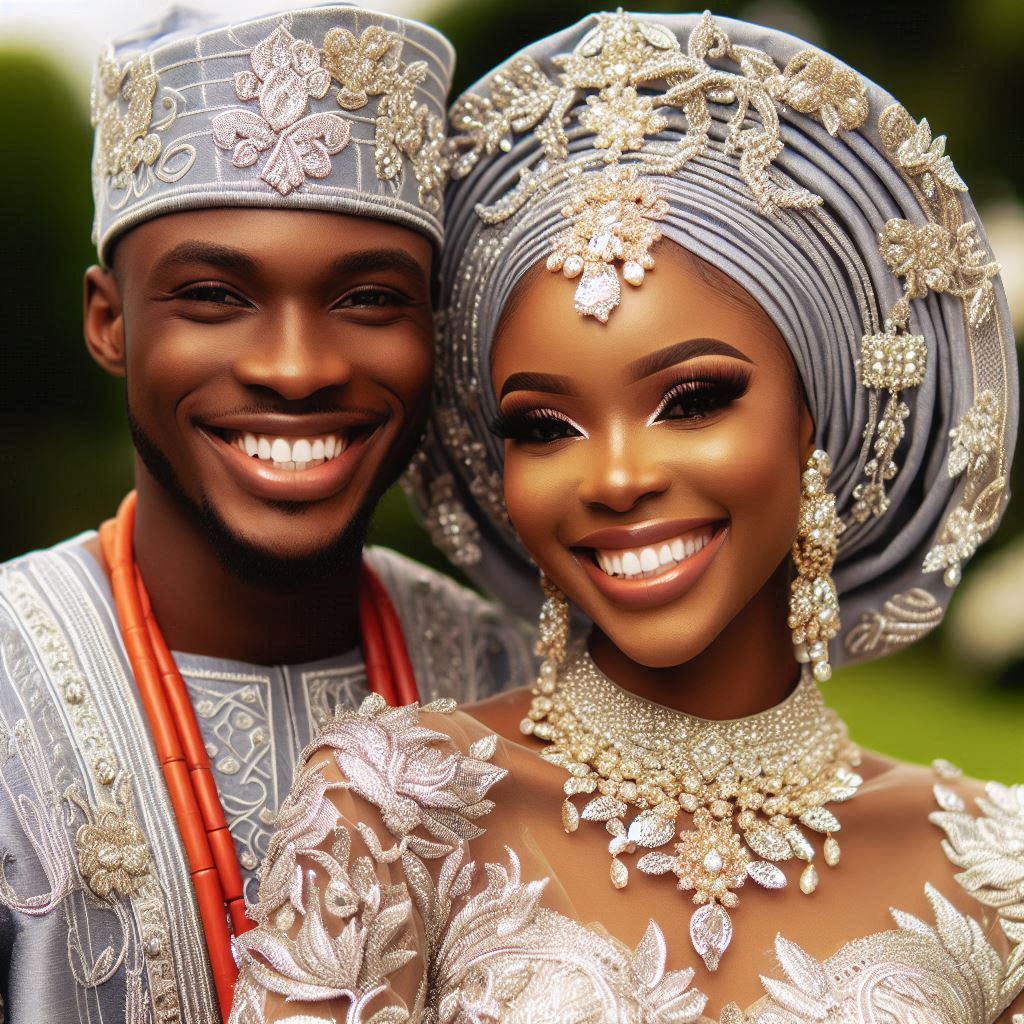
Cultural Significance of Bridal Couture
Nigerian bridal couture plays a vital role in expressing the rich cultural fabric of the nation.
Nigerian weddings are grand events that reflect cultural diversity, regional influences, and personal expressions of love.
Bridal fashion is a canvas showcasing these elements.
Each design narrates a story unique to its cultural origins.
Cultural Diversity in Bridal Fashion
Nigeria is home to over 200 ethnic groups.
Each group has its unique customs and traditions.
When it comes to bridal attire, these differences shine brightly.
Designers incorporate local materials, traditional patterns, and cultural insignias in their creations.
This fashion serves as a mirror, reflecting the multi-faceted identity of Nigeria.
- Ethnic Variations: Different ethnic groups have distinct styles of bridal wear.
For example, Yoruba brides often wear “Iro and Buba,” a traditional wrapper and blouse combination. - Color Significance: Colors carry deep meanings.
White symbolizes purity, while red often signifies love and passion. - Regional Specifics: Brides from the North may favor elaborate beaded dresses, while Southern brides might lean towards sophisticated lace fabrics.
These variations in bridal couture evoke regional pride.
They celebrate the uniqueness of every culture within Nigeria.
Designers are constantly inspired to innovate while respecting tradition.
Symbolism in Designs and Materials
Nigerian bridal attire often tells a layered story.
Every design element contains symbolism tied to cultural beliefs.
Designers are mindful of these meanings when creating their works.
- Fabrics: Common materials include lace, silk, and ankara.
Each fabric choice tells a different story of heritage and craftsmanship. - Embellishments: Beading, sequins, and embroidery often enhance dresses.
These details might symbolize prosperity or beauty. - Styles: The structure of dresses can convey status.
A fitted gown may signal modernity, while a traditional wrapper indicates cultural respect.
Brides often choose materials that represent their family lineage.
Such choices connect the modern bride to her ancestral roots.
The fashion thus becomes a tangible expression of identity.
Connection to Traditional Customs and Ceremonies
Understanding the role of bridal couture requires exploring traditional wedding customs.
Each wedding ritual enhances the meaning behind bridal wear.
From traditional engagement events to religious ceremonies, attire plays a pivotal part.
- Engagement Customs: During the engagement, brides often wear outfits that honor their heritage.
This showcases respect for family traditions. - Traditional Rites: Many ceremonies require brides to wear multiple outfits.
Each outfit signifies different cultural customs and blessings. - Religious Celebrations: Brides may wear specific colors or styles that align with religious practices.
This allows the bride to weave spirituality into her big day.
Such ceremonies often demand additional preparations.
Families meet to ensure that traditions are upheld.
This dialogue around bridal couture blends modern desires with age-old customs.
Growth of Nigerian Bridal Couture Industry
The Nigerian bridal couture industry has evolved dramatically in recent years.
Designers are gaining international recognition.
This has led to increased creativity and innovation.
- Emergence of New Designers: Young designers are revitalizing traditional styles.
They create new aesthetics that resonate with modern brides. - Influence of Social Media: Platforms like Instagram allow designers to showcase their work.
This connects them directly with brides, globally. - Collaboration with Influencers: Influencers help popularize various designers, broadening their audience.
This leads to increased inquiries and custom orders.
The industry also supports local artisans.
Many bridal designers collaborate with tailors and fabric suppliers.
This creates job opportunities and fosters economic growth.
Sustainable Practices in Bridal Couture
A growing awareness of sustainability influences bridal couture.
Designers are seeking ways to reduce their environmental impact.
This includes using locally sourced materials and eco-friendly production methods.
- Recycled Fabrics: Many designers are experimenting with recycled materials.
This reduces waste while creating unique pieces. - Supporting Artisans: Collaborating with local artists to create handcrafted items promotes traditional skills.
- Minimalist Designs: There is a move towards simpler, timeless designs that can be worn beyond the wedding day.
This helps reduce the need for wasteful fast fashion.
Brides are becoming more intentional about their choices.
Many seek dresses that align with their values.
This shift towards sustainability revolutionizes the bridal couture landscape.
A Personal Journey
Choosing bridal couture is a deeply personal journey.
Brides today want to express their unique identities and cultural heritage.
The rise of Nigerian bridal couture provides a golden opportunity for this expression.
Every bridesmaid and bride can connect further with their cultures through attire.
Designers continue to innovate while honoring tradition.
This ensures that every wedding remains a celebration of love and diversity.
Nigerian bridal couture not only influences aesthetics but also cultural significance.
It showcases the beauty of heritage while moving towards a sustainable future.
As you plan your big day, consider what your attire says about you and your heritage.
Remember, bridal couture is more than just fashion; it’s a story waiting to be told.
Read: Navigating Cultural Differences for A Successful Nigerian Marriage
Budgeting for Bridal Couture
Planning your wedding can be both exciting and overwhelming.
One of the most significant expenses involves your bridal gown.
It’s essential to budget wisely for your bridal couture.
Understanding your options can help you make informed decisions.
Tips on How to Plan and Budget for a Bridal Gown
- Set a Total Budget: Determine how much you’re willing to spend overall.
This amount should include all wedding-related expenses, including the gown, accessories, and alterations. - Allocate Funds for Each Item: Break down your total budget into categories.
Decide how much to allocate for the bridal gown, shoes, veil, and other accessories. - Research Prices: Spend time researching typical prices for bridal couture in your area.
Understanding average costs will guide your budget planning. - Consider Additional Costs: Account for alterations, shipping fees, and taxes.
These costs can add up, so be prepared. - Save Early: Start saving as soon as you get engaged.
The earlier you begin to save, the less financial pressure you’ll feel later. - Explore Payment Plans: Some bridal boutiques offer payment plans.
This option allows you to spread the cost over several months.
Comparison of Costs Between Custom Couture and Ready-to-Wear Options
When choosing a gown, you generally find two main types: custom couture and ready-to-wear options.
Here’s a breakdown of their cost differences:
Custom Couture
- Price Range: Custom gowns typically start at $1,500 and can go upwards of $10,000, depending on the designer.
- Detailing: Expect intricate detailing, unique designs, and personalized touches.
- Fit: Custom gowns are tailored specifically to your body measurements, providing a perfect fit.
- Time: Custom dresses usually require several fittings and weeks to months of lead time.
Ready-to-Wear
- Price Range: These gowns generally range from $300 to $3,000, making them more affordable.
- Selection: Ready-to-wear options offer a variety of styles and sizes to choose from immediately.
- Alterations: Many brides still need alterations, which can add to the total cost.
- Availability: You can purchase these dresses immediately, which is ideal for tight timelines.
Advice on Prioritizing Expenditures Without Compromising Style
Staying within your budget while achieving the look you desire is possible.
Follow these strategies:
- Identify Your Priorities: Decide what elements are most important to you.
Whether it’s the gown’s fabric, designer, or unique embellishments, identify what matters most. - Shop Off-Season: If possible, buy your gown during off-peak times.
Designers often have sales or discounts during slower seasons. - Consider Sample Sales: Many boutiques sell sample dresses at reduced prices.
This option can offer significant savings. - Renting Options: Consider renting a designer gown.
This option allows you to wear a high-end dress at a fraction of the retail cost. - Focus on Accessories: If your gown is simple, invest in statement accessories.
A beautiful veil or jewelry can elevate the overall look. - DIY Elements: If you’re crafty, consider making your bridal accessories.
This approach can save money while adding a personal touch.
While planning your wedding, prioritize your bridal gown.
Take time to reflect on what you truly desire.
With careful budgeting and thoughtful planning, you can achieve the stunning look you want without overspending.
As you consider your options, keep in mind the importance of both style and comfort.
Your wedding day should reflect your personality and love story.
Therefore, choose a gown that resonates with you.
By setting a realistic budget, exploring various options, and prioritizing expenditures, you can find the perfect bridal look that honors your style without breaking the bank.
Read: Essential Nigerian Wedding Planning Tips for A Perfect Ceremony
Choosing the Right Bridal Attire for Your Wedding
Choosing the right bridal attire for your wedding can be a complex but rewarding process.
Several factors influence your decision, including the venue, theme, and your personal style.
Understanding these elements can significantly enhance your overall wedding experience.
Here, we explore each aspect in detail.
Factors to Consider When Selecting a Bridal Gown
When selecting a bridal gown, consider the following key factors:
- Venue: The location of your wedding plays a crucial role in gown selection.
A beach wedding calls for lighter fabrics and an easy silhouette.
In contrast, a formal church ceremony may require a more traditional gown. - Theme: Your wedding theme should harmonize with your gown.
A vintage-themed wedding lends itself to lace and intricate details, while a modern theme may call for sleek lines and minimalist designs. - Personal Style: Your individual style should shine through your wedding attire.
Whether you prefer bohemian, classic, or contemporary styles, your gown should reflect your personality.
Try to envision how these factors influence your attire.
Collaborating with your wedding planner can also provide valuable insights into gown selection.
Consider making a mood board to visualize your ideas. Include images, colors, and textures that inspire you.
This can guide your decisions in a more structured way.
The Importance of Fittings and Materials
Bridal fittings are essential for ensuring your gown fits perfectly.
A well-fitting gown enhances your confidence and comfort.
Pay attention to the following aspects during fittings:
- Comfort: Comfort is paramount.
Test your gown’s fabric by moving around.
Consider whether you’ll be dancing, sitting, or walking.
Aim for a gown that feels good, not constricting. - Support: Ensure your gown provides the necessary support.
The right undergarments can enhance your silhouette and lift.
Professional alterations might be necessary to achieve the desired fit. - Material: Choose fabrics that accommodate the weather and venue.
Light materials like chiffon work well for summer weddings, while heavier fabrics such as satin are great for winter.
Don’t underestimate the power of fittings.
Schedule multiple appointments as needed.
Each fitting helps identify areas needing adjustment.
Aim for a gown that moves fluidly with you.
This helps avoid wardrobe malfunctions on your big day.
Incorporating Personal Touches and Cultural Elements
Infusing your gown with personal touches creates a unique narrative.
Consider the following ideas to make your gown truly yours:
- Cultural Symbols: Incorporate elements from your heritage.
This could be embroidery, colors, or traditional fabrics.
These details honor your background and add a meaningful layer to your wedding attire. - Family Heirlooms: Wearing a family heirloom can add sentimental value.
Incorporate it into your outfit, like a brooch or piece of jewelry.
This keeps cherished memories close on your big day. - Custom Alterations: Work with a designer to create a unique design.
Personalizing your gown can mean altering the neckline or adding special embellishments.
Custom details showcase your creative vision.
These personal touches serve as reminders of your journey.
They narrate your love story to everyone present.
Celebrating your identity through your gown enriches your wedding experience.
Make sure to communicate openly with your designer. Sharing your vision helps in bringing your ideas to life.
Selecting the right bridal attire is crucial for your wedding day.
By considering the venue, theme, and personal style, you lay the foundation for a perfect dress.
Fittings and materials play significant roles in comfort and elegance. Finally, integrating personal and cultural elements into your gown transforms it into a cherished heirloom.
As you prepare for your big day, embrace the journey of finding the ideal bridal gown.
Remember, this attire represents not only your love story but also your unique identity.
Enjoy each step along the way, and make your wedding attire a true reflection of who you are.
Conclusion
The rise of bridal couture in Nigeria marks a significant shift in wedding fashion.
Designers have gained international recognition and acclaim for their unique styles.
This trend empowers brides to express their individuality on their big day.
Nigerian bridal couture celebrates vibrant colors, intricate beadwork, and rich fabrics.
Each piece tells a story, showcasing cultural heritage and artistic innovation.
For brides-to-be, this evolution in bridal fashion presents numerous opportunities.
It encourages you to explore personal style while embracing your roots.
Whether you prefer traditional attire or modern designs, Nigerian couture provides endless options.
You can choose elegant gowns with cultural signatures or contemporary silhouettes that reflect your personality.
Incorporating Nigerian bridal couture into your wedding attire allows you to honor your heritage.
It also showcases the talents of local designers who pour their creativity into every stitch.
Supporting these artisans strengthens the bridal fashion industry and helps preserve traditional craftsmanship.
Moreover, experimenting with fabrics, accessories, and designs can result in a truly unique look.
Nigerian designers often blend various styles, creating something fresh and original.
This approach allows you to stand out while paying tribute to your lineage.
As you plan your wedding, take the time to discover Nigerian bridal couture.
Browse collections that resonate with you, and don’t hesitate to reach out to designers.
Collaborate with them to create a gown that reflects your style and heritage.
Embrace this opportunity to champion Nigerian design in your bridal choices.
By doing so, you celebrate not only your love story but also the rich tapestry of Nigerian culture.
Your wedding attire should be a beautiful reflection of who you are, so let it narrate your unique journey.
Ultimately, let your bridal style be a celebration of love, culture, and individuality.
Explore Nigerian bridal couture to make your wedding day unforgettable.

